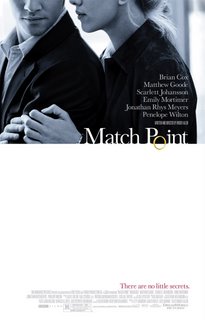Is "Match Point" Woody Allen's Comeback?

Sandra Kraisirideja
Woody Allen’s films are not for everyone and he would be the first to admit he doesn’t have fans (a fact he stated in a recent Premiere magazine interview), but for those who admire his work, the 70-year-old director is a master storyteller.
After 47 films it would stand to reason that Allen would have a few missteps in his career. In the last few years, some of his most devoted followers (like me) probably wondered if he had lost his touch.
Allen’s latest movie, “Match Point,” is a return to darker subject matter for the director and offers his audience some reassurance that he’s still got it.
“Match Point” tackles infidelity and morality, two of Allen’s most-written about subjects. The film opened Dec. 28 and is being distributed by DreamWorks.
A former tennis pro, Chris Wilton, (Jonathan Rhys Meyers) marries the daughter (Emily Mortimer) of a wealthy London businessman (Brian Cox) and shortly afterward begins an affair with a struggling American actress (Scarlett Johansson), who happens to be the former fiancé of his new brother-in-law (Matthew Goode).
Much has been written about the almost entirely British cast and the fact that Allen shot the movie in London instead of New York. What’s interesting is how well Allen’s style works in a London setting. If there is a city that could rival New York in terms of art, culture, music and the importance of social status, it’s London.
Another big change Allen fans may notice is his use of opera arias rather than jazz numbers in the soundtrack.
The setting and culture may be different, but the feel of the movie is similar to the director’s other films.
The people in Allen’s films are always fabulous socialites or intellectuals, but they suffer from the same foibles as ordinary people. That is what makes his films so entertaining.
Watching his movies is a voyeuristic experience, but it goes deeper than that because he shows the weaknesses of his characters and demonstrates that with all their wealth and influence they can be as clueless and helpless as someone without wealth.
Allen doesn’t write characters in strictly black-and-white terms. There is never one completely evil or completely pure person in his films. What is terrific about “Match Point” is that it doesn’t tell the audience how to think about the decisions the characters make.
Allen’s movies are always driven by dialogue and “Match Point” is no exception. I suspect it’s what attracts actors to work with him.
Allen did an excellent job casting the film and the actors nail their parts. Allen was so impressed by Johansson that he cast her in his next project, “Scoop,” which was also filmed in London.
At his best, Allen produces work that is thought-provoking and instant conversation starters after the lights come up in the theater. It’s a rare thing these days when a film provokes discussion beyond judging whether it was good or bad.

